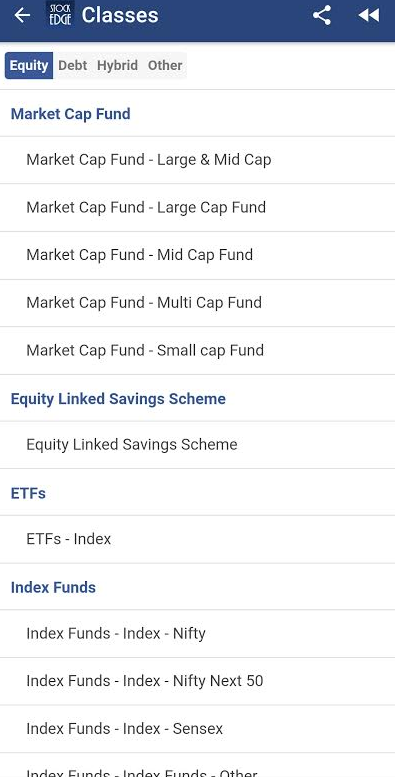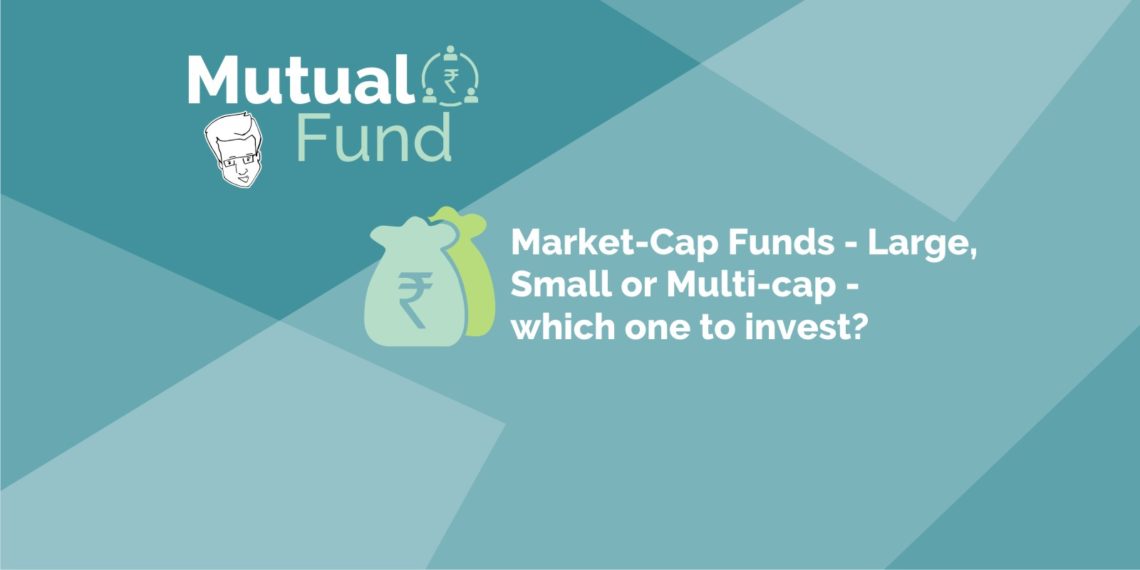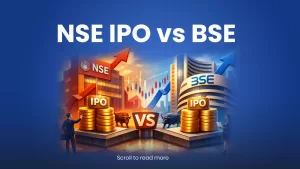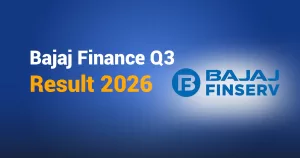Table of Contents
Mutual Funds are broadly classified as Equity funds, Debt funds and Hybrid funds based on the asset class they invest in. Each fund class is then further sub categorized based on a number of other factors.
One such category of an Equity fund is a Market Capitalization Fund. Mutual funds which are categorized based on the market capitalization of the companies they invest in are known as Market Cap Funds.
But before we get into the details of how market cap funds work, let’s first understand what market cap or market capitalization stands for.
What is a Market Capitalization?
A company’s market capitalization is calculated by multiplying the number of outstanding shares of the company with the current market price per share.
So let’s say a company has 10 crore outstanding shares and the current stock price of the company is Rs.100.
In this case, Market Cap = 10*100, which would mean a market cap of Rs.1000 crore.
Importance of Market Capitalization Investing:
Market Cap allows investors to assess the size of a company with respect to another. The larger a company’s market cap, the more dominant the company would be in the sector that it operates. Such information is essential to understanding the risk and return potential of an investment. This is because a larger company would generally have a better balance sheet and as a result would have more resources at its disposal. This inturn would mean that investing in such a company would be less risky.
At the same time, investing in a company which is smaller in size could come with higher risks but the growth potential of a smaller company is much higher. Smaller companies can grow in size significantly faster than an already established company, So investing in them can fetch substantially higher returns too.
Classification of Large, Mid and Small Cap Companies:
According to SEBI(Security Exchange Board of India) which is India’s stock market regulator, companies can be categorized based on their market capitalization as either a large-cap, mid-cap or small-cap company. Every company that trades in the Indian stock markets belongs to one of the above 3 categories.
- Large-Cap companies – These are the first 100 companies in terms of market capitalization. To put it simply, they form the 100 largest companies in terms of their market size. For eg, Reliance Industries and Infosys.
- Mid-Cap companies – The companies which fall between the top 101st to the 250th position in terms of market cap fall under this category. Examples of mid-cap companies are Laurus Labs and Polycab India.
- Small-Cap companies – All the other listed companies that follow after the 250th company in terms of market cap fall under the small-cap category. Dish TV and IDFC Ltd. are examples of small-cap companies.
Market Capitalization Mutual Funds:
Depending on the market-cap of the companies in which investments are made, SEBI has classified market-cap funds into 5 types, each catering to different financial objectives and risk appetites of an investor.

1. Large-cap Funds
Large-cap funds invest a large portion of their total holdings in stocks of large cap companies. As per SEBI(Securities and Exchange Board of India) guidelines, large-cap funds are mandated to invest at least 80% of their corpus in large cap stocks.
Such funds are usually the least risky of all market cap funds as they invest in highly-reputed companies with a good track record. They are a good option for long term investors with a lower risk appetite.
See also: Important Mutual Fund Ratios
2. Mid-cap Funds:
As the name suggests, these funds invest a large portion of their corpus in stocks of mid-cap companies. In this case, SEBI mandates a minimum investment of 65% in mid cap stocks.
Such mutual fund schemes are riskier when compared to large cap funds. But since mid-cap companies hold the potential to one day become a large-cap company, their growth potential is higher. As a result, mid-cap funds have the potential to generate higher returns in the long term than large-cap funds.
3. Small-Cap Funds:
As per SEBI, such schemes invest at least 65% of their corpus in equities of small-cap companies.
Since many small-caps are young companies, they have significant growth potential. So over a long term period, small-cap funds hold the potential to generate very high returns for their investors. However, the risk of failure of smaller companies is also high.
So such funds are for investors who have a high risk taking ability.
4. Large & Mid-Cap Funds:
Such funds invest their corpus in a mix of large and mid-cap companies. According to SEBI rules, such funds are required to invest at least 35% of their total assets in equities of large cap companies and at least 35% in equities of mid-cap companies.
These funds are designed to offer the stability of large-cap funds along with the higher returns of mid-cap funds. So such funds can offer higher returns than large-cap funds and are less riskier than pure mid-cap funds.
5. Multi-Cap Funds (updated as per new regulation):
Multi-cap funds also known as Diversified Equity Funds invest in stocks from all 3 market cap categories. To put it simply, their holdings include a mixture of stocks from large, mid and small cap categories.
These funds provide the benefit of diversification by investing across the wide spectrum of the stock markets. According to the SEBI rules, at least 75% of a multi-cap fund’s portfolio must include stocks. Further it is necessary for the funds to invest at least 25% of their portfolio in each capitalization category. Which means at least 25% each in large, mid and small cap companies.
Things to know before investing:
All Market Cap funds are open ended schemes which means that they don’t have lock-ins. So as an investor, you can invest in them and redeem your investments anytime.
Something important you should keep in mind before investing is a fund’s expense ratio. Expense ratio is a fee charged by the AMC(Asset Management Company) for managing your investments and meeting fund’s expenses. SEBI has mandated that a mutual fund company cannot charge more than 2.50% as expense fees.
Though expense ratios may sound fairly low at the time of investing, over a long-term tenure these expenses can really diminish your returns.
Taxation of Market Capitalization Funds:
Since market cap funds are equity linked mutual funds, they fall under the gambit of Capital Gains Taxes and Dividend Distribution Tax.
- Every time the fund house makes a dividend payment, it deducts a Dividend Distribution Tax of 10%.
- If you invest in such funds for more than 1 year, then at the time of redemption, you would be subject to a Long Term Capital Gains(LTCG)tax of 10% on your profits. LTCG of up to Rs 1 lakh is tax-free.
- For investments that are redeemed before 1 year, a Short Term Capital Gains Tax of 15% is applicable on the profits.
You can also watch the video below on Market Cap Funds!
Click here to know more about the Premium offering of StockEdge.
You can check out the desktop version of StockEdge using this link.











